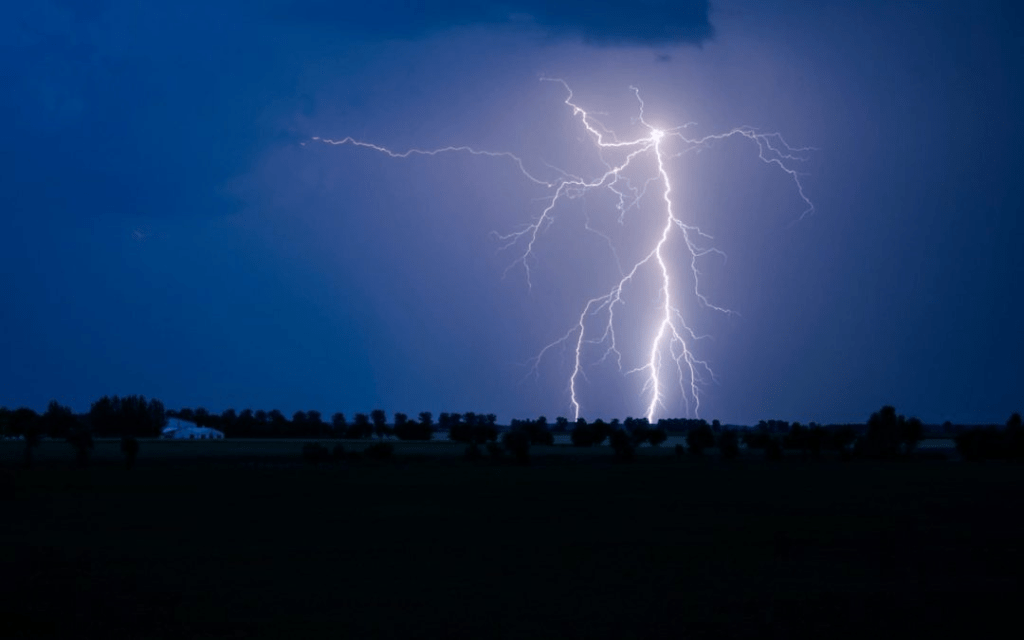When considering roofing options, homeowners often encounter myths and misconceptions about different materials. One prevalent concern is whether a metal roof attracts lightning more than other types of roofing. This article explores the question: Does a metal roof attract lightning? We’ll dive into the facts, debunk myths, and provide practical insights into the safety and performance of metal roofs in lightning-prone areas.

Understanding Metal Roofs and Lightning
How Lightning Works
To address whether metal roofs attract lightning, it’s essential to understand how lightning works. Lightning is a natural electrical discharge caused by an imbalance between storm clouds and the ground. When a storm cloud accumulates enough electrical charge, it seeks a path to the ground, which can result in a lightning strike.
Key Points:
- Lightning Path: Lightning doesn’t “choose” targets based on material; it follows the path of least resistance.
- Conductivity: Metals are good conductors of electricity, but that doesn’t mean they attract lightning more than other materials.
Metal Roofs and Lightning Attraction
One of the common myths is that metal roofs are more likely to attract lightning because they are good conductors. However, this is a misunderstanding of how lightning behaves.
Myth vs. Fact:
- Myth: Metal roofs attract lightning.
- Fact: Metal roofs do not attract lightning. They are, however, excellent conductors, which means if lightning strikes a metal roof, the electricity is safely conducted away from the building.
Read too: Is It Reasonable to Ask the Seller to Replace the Roof?
Does a Metal Roof Increase the Risk of Lightning Strikes?
Risk Factors
The risk of a building being struck by lightning is influenced by several factors, including its height, location, and surrounding environment. Here’s a breakdown:
- Height of the Building: Taller buildings are more likely to be struck by lightning. A metal roof does not influence this risk; the building’s height does.
- Location: Areas prone to frequent thunderstorms are at higher risk. The material of the roof does not affect this risk.
- Surrounding Structures: Buildings near taller structures or trees may be less likely to be struck than those in open areas.
Lightning Protection Systems
Regardless of roofing material, installing a lightning protection system can enhance safety. These systems include:
- Lightning Rods: Metal rods installed at the highest points of a building to provide a direct path for lightning to follow safely into the ground.
- Conductors: Wires that connect the lightning rods to the grounding system, ensuring the lightning is conducted away from the building.
- Grounding Systems: Rods or plates buried in the ground to disperse the electrical charge safely.
Advantages of Metal Roofs in Lightning Situations
While metal roofs do not attract lightning, they offer several advantages if a lightning strike occurs:
- Even Distribution of Charge: Metal roofs can distribute the electrical charge from a lightning strike evenly across the roof, reducing the risk of localized damage.
- Fire Resistance: Metal roofs are less likely to catch fire from a lightning strike compared to materials like wood shingles, making them a safer choice in lightning-prone areas.
- Durability: Metal roofs are highly durable and can withstand the impact of debris and other damage, making them resilient in severe weather conditions.
Installation Considerations
Ensuring Safety
To ensure the safety of your metal roof, consider the following:
- Proper Installation: Ensure the metal roof is installed correctly by professionals to avoid potential issues.
- Regular Maintenance: Regular inspections can identify and address any wear or damage that could affect the roof’s performance during severe weather.
Local Building Codes
Check local building codes and regulations regarding lightning protection and metal roofing. Some areas may have specific requirements for lightning rods and grounding systems to ensure safety.
Real-World Examples
Example 1: Urban High-Rise
In a city high-rise with a metal roof, the building has a comprehensive lightning protection system. Despite the metal roof, the lightning rods and grounding system effectively protect the building from lightning strikes.
Example 2: Country Home
A country home with a metal roof and no lightning protection system experienced a lightning strike during a storm. The metal roof safely conducted the electricity, and the damage was minimal, highlighting the benefits of using metal roofs.
Conclusion
Does a metal roof attract lightning? The answer is no. Metal roofs do not attract lightning more than other roofing materials. They are, however, effective in safely conducting the electrical charge from a lightning strike, which can minimize potential damage and increase safety. By understanding how lightning works and ensuring proper installation and maintenance, homeowners can confidently choose metal roofing without worrying about increased lightning risk.



Leave a Reply